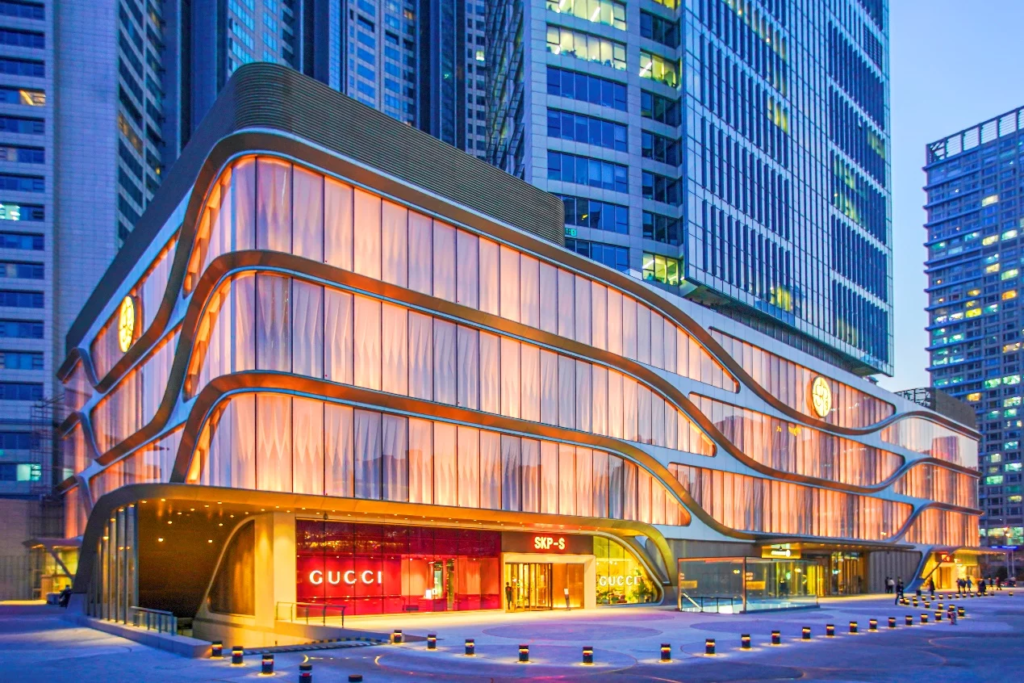The French luxury department store Galeries Lafayette in Berlin will close its doors after nearly three decades. The future use of the building on Friedrichstraße remains undecided.

In the almost-empty store, only a few bags and shoes remain on the shelves, illuminated by the bright logos of luxury brands. Most of the gourmet department’s expensive champagnes, wines, and fragrant teas are gone. Recent clearance sales attracted many bargain hunters, like a young woman who proudly showcased her new designer bag, bought at a 60% discount.
Others visit the store for a final farewell. “I took a few more photos inside to capture the store,” said an elderly lady leaving the glass entrance. “Galeries Lafayette was an institution,” she added, expressing sadness over the diminishing number of retail stores. For another customer who worked nearby and often had lunch there, it is “the end of an era.”
Turning towards Asia
Hundreds lined up for the store’s opening in 1996, the first and only location of the French department store chain in Germany. On 8,000 square meters, it offered exclusive fashion and top-tier gastronomy. Designed by French star architect Jean Nouvel, the glass palace was seen as a signal of progress for the capital, noted Nils Busch-Petersen, chief executive of the Berlin-Brandenburg trade association. “Back then, few paid attention to Berlin, and then Galeries Lafayette set up its first international branch here.”
However, in recent years, the department store chain faced economic challenges and the business no longer seemed viable. The closure is “a result of changing consumer habits in Germany and significant changes in the city’s retail market,” the company said when it announced the closure in October 2023.
New markets in India and China
The department store chain is now focusing on Asia, planning new locations in India and China, where the luxury segment is still growing, said Lech Suwala, professor of urban and regional economics at the Technical University of Berlin. “In the global East, the rise of the middle class has partly occurred. It is expected that this middle class will be able to consume high-priced brand and luxury goods,” Suwala explained.

“Fundamentally, the luxury market in Europe still functions and is attractive,” said Johannes Berentzen, managing partner of BBE Handelsberatung. But with only one store in Germany, Galeries Lafayette’s impact was “always limited.”
A competitive retail landscape
Competition is fierce: less than a kilometer from Galeries Lafayette, around Potsdamer Platz, a competitive retail landscape has developed over the past decades. Shopping centers like “Mall of Berlin” and the recently opened “The Playce” offer similar concepts and target groups. Additionally, the store struggled to recover from the absence of tourists, the rise of remote work with empty offices, and reduced foot traffic during the COVID-19 pandemic.
Reimagining the city center
The Friedrichstraße building is owned by the US company Tishman Speyer, which plans to modernize it. The future use of the building is still open. “Now we have the chance to rethink the city center,” said economist Suwala. “Who says the building must only host retail if consumption continues to shift online?” He suggested creating a mix of culture, gastronomy, and citizen services from authorities.
The idea of using the building as a new location for libraries, such as the Berlin Central and Regional Library, is welcomed by urban and regional planners. It would attract a wider range of people and contribute to revitalizing the surrounding area, Suwala said. He sees the library as an opportunity to breathe new life into the city center.
Library idea gets support
Office spaces in the building are also a possibility. The outcome is still uncertain. “We are pursuing various options, one of which is the use as a library,” a spokesperson for the property owners said to the dpa news agency. “If left to the market, start-ups or accelerators often take over,” Suwala noted. “Or the spaces are municipally acquired and places for community interaction, like a library, can be planned.”
Many of Galeries Lafayette’s last customers support the idea of a library in the former luxury store, as do neighboring retailers, according to the Berlin-Brandenburg trade association. TU professor Suwala is clear: “The way things were before will not work today.” This applies not just to Berlin, but to all city centers where department stores have closed.









